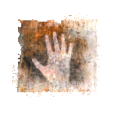Musique électroacoustique latino-américaine
Rajmil Fischman, Los Dados Eternos, 1991
(Pérou)
Durée de l'enregistrement : 23 min 35 s.
Instruments : Pour hautbois, bande et traitement en temps réel
Autres ressources disponibles :
- À propos de Rajmil Fischman
- Compositions par Rajmil Fischman
À propos de cette composition :
[Traduction française non disponible]This is a piece for oboe, tape and real-time processing. The instrumental part includes a range of extended techniques such as multiphonics, sucking the reed, singing and playing, etc. In addition, sounds coming out from the oboe are processed during performance by two effects units, serving as a further extension of the capabilities of the instrument. This processing also creates a middle ground in which concrete sounds contained in the tape meet the sonic world produced by the live performer.
The tape serves several functions. In the first place it acts as an environment which transports the setting of the performance into diverse landscapes and situations. Secondly, it also fulfils an 'orchestral' function, complementing the solo performer either in an harmonic-timbral manner, or rhythmically by means of gestural counterpoint. Finally, it also contributes to the middle ground by using oboe sounds, which blend with the rest of the landscape or transform into other sounds. The performer is sometimes required to mimic some of these sampled oboe sounds in order to give the impression that they are coming out of the actual instrument. On other occasions, sounds produced by the performer are overlapped by the tape, which transforms them in a manner which would be impossible for a real oboe. The tape was realised at Keele University studios.
Although this is not a programmatic piece, it was inspired by a poem of the same name by the Peruvian poet César Vallejo (1892-1938), which deals with the struggle between divinity and humanity, its results and implications. Los Dados Eternos is strongly influenced by Latin American culture, both, in its reference to music and language and in the unconscious manifestations of rhythm and dance within more abstract electroacoustic material.
Performances include the 1991 International Computer Music Weekend, Keele, UK; International Computer Music Conference 1991, Montreal; Adrian Boult Centre, Birmingham, UK; broadcasts in the National Radio of Israel, National Radio of Colombia and Radio of the City of Buenos Aires.
Los Dados Eternos
Dios mío, estoy llorando el ser
que vivo;
me pesa haber tomádote tu pan;
pero este pobre barro pensativo
no es costra fermentada en tu costado;
tú no tienes Marías que se ván!
Dios mío, si tú hubieras sido hombre,
hoy supieras ser Dios;
pero tú, que estuviste siempre bien,
no sientes nada de tu creación.
Y el hombre sí te sufre: el Dios es él!
Hoy que en mis ojos brujos hay candelas,
como en un condenado,
Dios mío, prenderás todas tus velas,
y jugaremos con el viejo dado ...
Tal vez ¡oh jugador! al dar la suerte
del universo todo,
surgirán las ojeras de la Muerte,
como dos ases fúnebres de lodo.
Dios mío, y esta noche sorda, oscura,
ya no podrás jugar, porque la Tierra
es un dado roído y ya redondo
a fuerza de rodar a la aventura,
que puede parar sino en un hueco,
en el hueco de inmensa seputura.
The Eternal Dice (free translation)
Oh God, I am crying from the depths of my being;
I regret having partaken of your bread;
but this lowly reasoning mud
is not a fermented scab on your side:
no Maries flee from you!
Oh God, if you had been Man,
you would know how to be God;
but you, being always well,
do not feel for your creation.
And Man suffers you. He is the God!
Today, with flames in my bewitched eyes,
like those in the condemned, Oh God, you will light your candles,
and we'll play with the ageing die ...
Perhaps, oh gambler! when the fortune
of the universe is forever set,
the two eye-holes of death will emerge
like two funeral aces of mud.
Oh God, and in this deaf, dark night,
you will not gamble, because the Earth,
rolling and rolling to its fate
is just an eroded and round die
that cannot stop but in a hole,
the immense hole of the grave.
Table des matières :
- Présentation
- Contexte historique
• Introduction
• Ouvrir la boîte
• Musique ici... et là
• Branché sur le son!
• Cuire, congeler... apprécier et faire apprécier
• Conclusion
• Remerciements
• Références - Instruments de recherche dans la collection
• Sélection musicale publique (558 titres)
- Lecteur audio
- Liste par compositeur
• Collection complète (1723 titres)
- Recherche par composition
- Recherche par compositeur
• Autres ressources
- Biographies
- Entretiens
- Partitions
- Photographies

